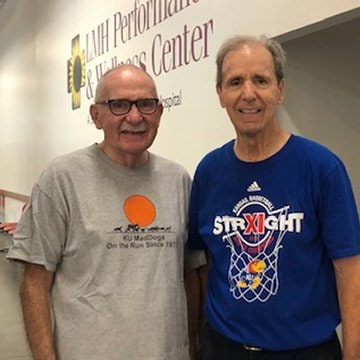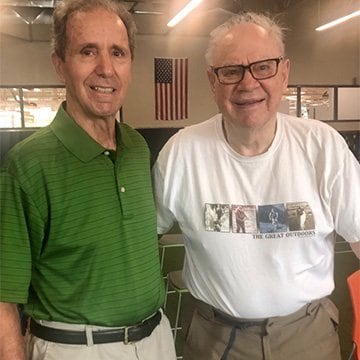Common thread of Parkinson’s turns colleagues into classmates
Professors at the University of Kansas aren’t only outstanding in academics, many also stand out as athletes. In the late 1980s when the men’s basketball team boasted players like Danny Manning, Chris Piper and Kevin Pritchard, a group of professors would gather on campus near the Robinson Center to work out.
Fast forward to the present day, you’ll find that some of these professors are at it again. Jim LaPointe, professor emeritus of the School of Education, heads to the golf course and for group walks with former colleagues. For the past couple of years, you can also spot him twice a week at the Sports Pavilion participating in an LMH Health class geared towards those living with Parkinson’s disease.

Jim Orr, left, and Jim LaPointe, right at a recent Circuit Moves class.
What is Parkinson’s?
Parkinson’s is a progressive central nervous system disorder that affects movement, causing symptoms such as tremors, slowness and stiffness. There is no cure but research strongly supports that the most effective way to slow and reduce the symptoms is through exercise.
“Parkinson’s not only affects how a person perceives their movements, it can also affect other aspects of their lives through cognitive changes, apathy and depression,” said Suzie Craig, physical therapist and instructor for the LMH Health Parkinson’s classes. “It’s important to understand this and that the cumulative effect of exercise influences disease progression.”
LaPointe enjoys the camaraderie of the class and seeing people he knows from around town and the university community. He said he was encouraged to join the Parkinson’s program by Donna Osness. Along with her husband, Wayne, the Osness family has been an integral part of the Parkinson’s program at LMH.
“I saw Donna at the Sports Pavilion one day and she told me ‘you need to start taking Suzie’s classes.’ I’ve known them since Wayne’s days as the director of the Health and Physical Education Department at KU,” LaPointe said. “Wayne is the one that hired me at the university in 1978. They’ve both been great friends to me and my wife, Ann.”
Jim Orr, professor emeritus of molecular biology, also encouraged LaPointe to join the Parkinson’s classes. Orr was a colleague at KU and was a members of a running group – the Mad Dog Runners. He recalled that LaPointe would take time out of his work day to stop and visit.
“Our group met near the Robinson Center on campus for lunchtime runs,” Orr said. “Jim would come out of his classroom and stop to chat. He was always so social and encouraging.”
Classes for a variety of abilities
LMH Health offers four levels of Parkinson’s classes each week on Monday and Wednesday mornings.
- Circuit Moves and Standing Moves: Classes involve using whole body movements in functional patterns.
- Sitting Moves: Designed for individuals who need a bit more assistance and have trouble walking.
- FUNctional Moves: New this fall, this class is for people using an assistive device to walk. It focuses on practicing movements needed for safety and mobility at home.

Jim Lapointe, left, and Wayne Osness, right.
Craig said she wants the classes to be fun, yet still challenge the participants.
“The movements in each class are large and exaggerated, enabling the participants to work with high effort while challenging their coordination and balance. To that end, we offer different levels of classes specific to the functional level of the individual. This allows each person to obtain a maximum level of effort,” she said.
LaPointe and Orr both attend the Circuit Moves class each week. The class builds on each movement and task, challenging both the body and mind. LaPointe appreciates the progression and the positive reinforcement that Craig provides.
“I appreciate the multitasking that Circuit Moves provides, like saying names of colors while stepping on them, as well as counting and spelling backwards. If I have trouble doing something, Suzie doesn’t make a big deal about it and encourages me,” he said.
Craig says it’s a huge compliment when former professors like LaPointe and Wayne Osness share how much they enjoy the Parkinson’s classes.
“Cheering them on to fight this disease and giving them the tools to carry those out is part of the process,” she said. “Every one of these participants is an athlete and this is a chance to bring this out in all of them.”